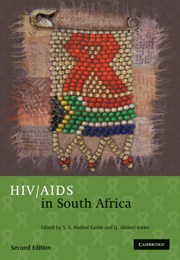Book contents
- Frontmatter
- Contents
- List of Contributors
- Foreword: Peter Piot
- Foreword: Nelson R Mandela
- Acknowledgements
- Section 1 Birth of a rapidly growing epidemic
- Section 2 The virus, the human host and their interactions
- Section 3 HIV risk factors and prevention strategiess
- Section 4 Focal groups for understanding the HIV epidemic
- 17 Heterosexual transmission of HIV – the importance of a gendered perspective in HIV prevention
- 18 Young people and HIV/AIDS in South Africa: prevalence of infection, risk factors and social context
- 19 Female sex workers
- 20 Population movement and the spread of HIV in southern Africa
- Section 5 The impact of AIDS
- Section 6 Treating HIV
- Section 7 What does the future hold?
- Index
19 - Female sex workers
Published online by Cambridge University Press: 07 September 2011
- Frontmatter
- Contents
- List of Contributors
- Foreword: Peter Piot
- Foreword: Nelson R Mandela
- Acknowledgements
- Section 1 Birth of a rapidly growing epidemic
- Section 2 The virus, the human host and their interactions
- Section 3 HIV risk factors and prevention strategiess
- Section 4 Focal groups for understanding the HIV epidemic
- 17 Heterosexual transmission of HIV – the importance of a gendered perspective in HIV prevention
- 18 Young people and HIV/AIDS in South Africa: prevalence of infection, risk factors and social context
- 19 Female sex workers
- 20 Population movement and the spread of HIV in southern Africa
- Section 5 The impact of AIDS
- Section 6 Treating HIV
- Section 7 What does the future hold?
- Index
Summary
THE COMPLEXITY OF SEX WORK in South Africa makes it a challenging task to regulate the sex work industry in order to implement effective HIV prevention programmes. Effective programmes of peer education and behaviour change can be implemented through targeted interventions and have been successful elsewhere in the world. However, since sex work is a criminal offence in this country, identifying sex workers for targeted interventions could result in further violence, stigma and social ostracism of these women.
The fact that sex work is illegal in no way limits the occupation. Sex has become a commodity that is used to ensure survival and may be exchanged for food and shelter as well as money. This chapter concentrates on the more traditional female sex workers who exchange sex for money. Most come from stable working class families.
Income among sex workers is racially skewed, with white women receiving the highest fees per coital act. The prevalence of hiv among sex workers also reflects racial differences, with the highest prevalence seen among black women.
The mining industry and truck-stops are important working areas and several studies have focused on the incidence of sexually transmitted infections (stis), including hiv, among these sex worker populations and their clients.
Condom use is an economic issue, with penetrative sex (vaginal or anal) attracting higher fees if no condom is used. Successful hiv and sti prevention programmes would require the government to recognise and accept the sex worker industry in the country by decriminalising sex work and promoting health-seeking behaviour among sex workers and their clients.
- Type
- Chapter
- Information
- HIV/AIDS in South Africa , pp. 329 - 341Publisher: Cambridge University PressPrint publication year: 2010
- 1
- Cited by



